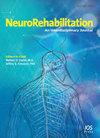Therapeutic effects of deep pharyngeal electrical stimulation combined with modified masako maneuver on aspiration in patients with stroke
IF 1.8
4区 医学
Q3 CLINICAL NEUROLOGY
引用次数: 0
Abstract
BACKGROUND:Stroke patients often experience difficulty swallowing. OBJECTIVE:To assist in the improvement of dysphagia symptoms by introducing a novel approach to the treatment of patients with post-stroke aspiration. METHODS:A total of 60 patients with post-stroke aspiration were enrolled and divided into an experimental group (n = 30) and a control group (n = 30). The control group received standard treatment, sham intraoral stimulation, and the Masako maneuver, while the experimental group was administered standard treatment, deep pharyngeal electrical stimulation (DPES), and a modified Masako maneuver. Changes in their Functional Oral Intake Scale (FOIS) and Rosenbek scale scores were observed. RESULTS:The FOIS scores of both groups increased significantly after treatment (p < 0.01, respectively). The Rosenbek scale scores of both groups decreased significantly after treatment, with the experimental group scoring significantly lower than the control group (1.01±0.09 vs. 2.30±0.82) (p < 0.05). After treatment, the overall response rate in the experimental group (93.33%) was significantly higher than that in the control group (83.33%) (p < 0.001). CONCLUSION:In terms of effectively improving dysphagia in aspiration patients after stroke, DPES combined with modified Masako maneuver is clinically recommended.咽深部电刺激联合改良麻子手法对中风患者吸入的治疗效果
背景:中风患者通常会出现吞咽困难。目的:通过引入一种治疗脑卒中后误吸患者的新方法,帮助患者改善吞咽困难症状。方法:共招募了 60 名中风后误吸患者,并将其分为实验组(30 人)和对照组(30 人)。对照组接受标准治疗、假口内刺激和正子手法,实验组则接受标准治疗、咽深部电刺激(DPES)和改良正子手法。观察他们的功能性口腔摄入量表(FOIS)和罗森贝克量表评分的变化。结果:治疗后,两组患者的功能性口腔摄入量表(FOIS)评分均有显著提高(P分别为0.01)。两组的罗森贝克量表评分在治疗后均明显下降,实验组的评分明显低于对照组(1.01±0.09 vs. 2.30±0.82)(p <0.05)。治疗后,实验组的总体反应率(93.33%)明显高于对照组(83.33%)(p <0.001)。结论:在有效改善脑卒中后误吸患者的吞咽困难方面,DPES 联合改良 Masako 手法值得临床推荐。
本文章由计算机程序翻译,如有差异,请以英文原文为准。
求助全文
约1分钟内获得全文
求助全文
来源期刊

NeuroRehabilitation
CLINICAL NEUROLOGY-REHABILITATION
CiteScore
3.20
自引率
0.00%
发文量
178
审稿时长
6-12 weeks
期刊介绍:
NeuroRehabilitation, an international, interdisciplinary, peer-reviewed journal, publishes manuscripts focused on scientifically based, practical information relevant to all aspects of neurologic rehabilitation. We publish unsolicited papers detailing original work/research that covers the full life span and range of neurological disabilities including stroke, spinal cord injury, traumatic brain injury, neuromuscular disease and other neurological disorders.
We also publish thematically organized issues that focus on specific clinical disorders, types of therapy and age groups. Proposals for thematic issues and suggestions for issue editors are welcomed.
 求助内容:
求助内容: 应助结果提醒方式:
应助结果提醒方式:


